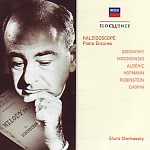For years I’ve hoarded an LP copy of Shura Cherkassky’s “Kaleidescope”, a 1974 studio recital of Romantic encores and transcriptions, in hopes that one day it might turn up on CD. That day has come, although I wish that Eloquence also had reprinted the irrepressible notes Cherkassky himself penned for the original release (not to disparage Raymond Tuttle’s excellent, newly commissioned annotations). Cherkassky’s sumptuous tone, ravishing legato touch, and propensity for bringing out inner voices (real and imagined) thrive like crazy in this repertoire. What relaxed authority and effortless textural differentiation he brings to Godowsky’s garish rewrites of Saint-Saëns’ The Swan, Rameau’s Tambourin, Schubert’s F minor Moment Musical, and the Albéniz Tango! Rubinstein’s once-hackneyed-now-ignored Melody in F rarely has sounded so eloquent and dignified.
The composer of the title track is Cherkassky’s one-time teacher and mentor Josef Hofmann, and I slightly prefer the latter’s leaner, more propulsive live performance over Cherkassky’s softer-grained mastery. However, another Hofmann specialty, Moszkowski’s Capriccio espagnole, showcases Cherkassky’s repeated-note technique at its effortless best. He also keeps Godowsky’s overly transcribed paraphrase on Johann Strauss II’s Wein, Weib, und Gesang afloat and moving forward, making judicious and (to my mind) justifiable cuts along the way.
Several live performances fill out the disc. These include a fey Rachmaninov Polka de W. R., a gorgeously sung out Scriabin D major Prelude Op. 11 No. 5, a rather glib yet charismatically detailed Chopin A-flat Ballade, and an equally freewheeling account of the same composer’s F minor Nocturne Op. 55 No. 2 that coheres more convincingly. For keyboard mavens with a sweet tooth, Shura Cherkassky was the Jacques Torres of the piano, and who wouldn’t want to indulge?
































